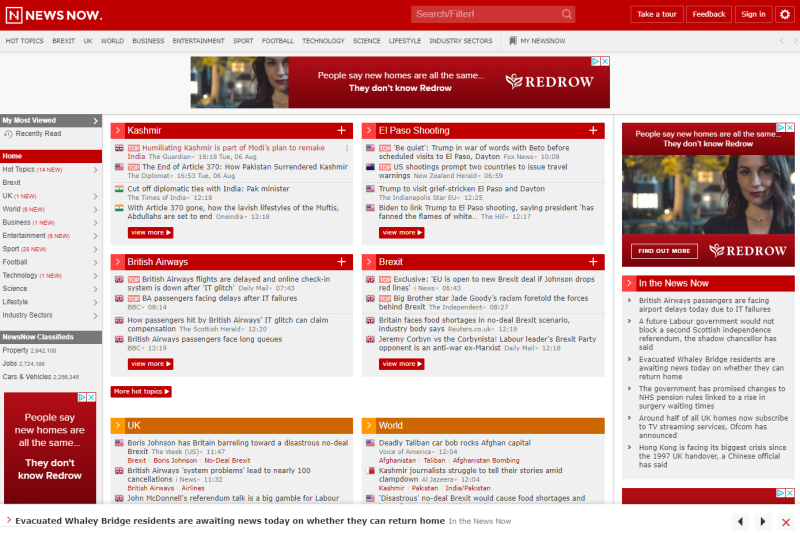
The chief executive of a UK news aggregator has shared fears that the EU Copyright Directive could have “perverse consequences” for small and medium publishers, ultimately reducing media plurality.
Struan Bartlett, who co-founded Newsnow in 1998, has spoken out about what he called the controversial concept of forcing fees on a website that sends traffic to news publications.
Under the Copyright Directive, aggregators and social media networks will have to pay if they use any more than a “very short extract” or “individual words” of content from a news publisher.
It was given the green light by the European Council in April and EU member states, which currently include the UK, now have two years to create legislation to match.
The new law was backed by more than 200 publishing and music organisations across Europe, including those represented by the Professional Publishers Association in the UK, which told MEPs it would create a “much-needed level playing field”.
But Bartlett told Press Gazette he had spoken to “many” small and medium publishers that had not been lobbying for the change and are “very concerned that this measure will have an adverse impact on their businesses and all the traffic they get, not just from us but from the bigger players, Google News, Facebook, others”.
Newsnow curates headlines and links to online articles by topic to give readers a range of sources in one place. According to Bartlett, the site gets between 10m and 15m monthly unique users.
Bartlett said: “The concern is that the big publishers will cut deals with the biggest sources of traffic and cut out the smaller players and that might happen either just because it’s convenient to strike a deal and the big publishers may be thinking we’ve got an opportunity here to cut out some smaller publishers.
“It might be that just the overheads of maintaining the commercial relationships with a very large number of publishers is onerous and there’s a very practical reason it’s necessary to limit the number of publishers.”
Bartlett said he was therefore “very concerned” about the potential impact on plurality, saying many publishers linked to by Newsnow “absolutely rely” on the traffic they get from aggregators, social media and news discovery platforms.
“Without those platforms they wouldn’t be able to reach – they wouldn’t have the brands that would allow the marketing budgets that would allow them to cut through and be the news destination that somebody would search for.”
On its “frequently asked questions” page on copyright reform, the European Commission said the Copyright Directive would give small and emerging publishers “the possibility to authorise or prohibit online uses of their press publications by platforms”.
“Publishers will be free to set the conditions to authorise the use of their content: they can do it for free or against remuneration, in accordance with their own business models. Any publisher, small or big, who gives free licences for the use of their content will be able to keep doing so.”

The Newsnow homepage on 7 August 2019
Bartlett claimed some of the opposition to the so-called “link tax” went under the radar before it was formally adopted because those advocating for it had a “very compelling message, which was that the likes of Google and Facebook are making money out of our content and depriving us of the funds we need to sustain high-quality journalism”.
Press Gazette’s Duopoly campaign, launched in April 2017, has been calling on Facebook and Google to stop “destroying journalism” and pay more back to news publishers on whose content they rely.
“While I think that is a simplistic argument to the level of absurdity, it nevertheless sounds very credible on its own and when you’ve got somebody putting together a very credible-sounding argument like that as a soundbite it can be very hard to cut through,” Bartlett said.
“Sadly that was how I felt things went.”
Bartlett also criticised the wording of the directive, saying the phrase “digital use” of publishers’ content was too vague.
This could lead to a “patchwork of legislation” across the EU that is “not going to create the unified digital single market” the bill was intended to and will be “very hard for any business providing links to content to manage,” he claimed.
But Bartlett added: “We need to accept that that law will be coming into UK law unless Brexit somehow puts paid to it. I’m not sure it will, and we are looking carefully at what the implications of that law will be for our business.”
According to surveys carried out by the European Commission, 57 per cent of internet users access news articles using social networks, information aggregators like Newsnow or search engines.
Almost half of these readers (47 per cent) read extracts compiled by these sites without clicking through to the publisher’s website itself.
Newsnow links to 13,000 online news sources from around the world, mostly in English language, with a broad definition of what constitutes news including Government information, charities and trade union releases alongside traditional press publishers.
It links to paywalled content as well as free-to-read articles, saying this drives sales to publishers by creating additional subscription sales.
Conspicuous by their absence are News UK titles including the Times and the Sun, which have been missing from Newsnow since 2010 after Rupert Murdoch condemned search engines and news aggregators who make money out of journalism without contributing anything in return.
Email pged@pressgazette.co.uk to point out mistakes, provide story tips or send in a letter for publication on our "Letters Page" blog
